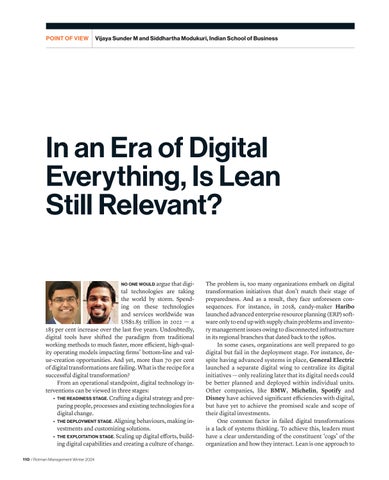POINT OF VIEW
Vijaya Sunder M and Siddhartha Modukuri, Indian School of Business
In an Era of Digital Everything, Is Lean Still Relevant? NO ONE WOULD argue that digital technologies are taking the world by storm. Spending on these technologies and services worldwide was US$1.85 trillion in 2022 — a 185 per cent increase over the last five years. Undoubtedly, digital tools have shifted the paradigm from traditional working methods to much faster, more efficient, high-quality operating models impacting firms’ bottom-line and value-creation opportunities. And yet, more than 70 per cent of digital transformations are failing. What is the recipe for a successful digital transformation? From an operational standpoint, digital technology interventions can be viewed in three stages: • THE READINESS STAGE. Crafting a digital strategy and preparing people, processes and existing technologies for a digital change. • THE DEPLOYMENT STAGE. Aligning behaviours, making investments and customizing solutions. • THE EXPLOITATION STAGE. Scaling up digital efforts, building digital capabilities and creating a culture of change. 110 / Rotman Management Winter 2024
The problem is, too many organizations embark on digital transformation initiatives that don’t match their stage of preparedness. And as a result, they face unforeseen consequences. For instance, in 2018, candy-maker Haribo launched advanced enterprise resource planning (ERP) software only to end up with supply chain problems and inventory management issues owing to disconnected infrastructure in its regional branches that dated back to the 1980s. In some cases, organizations are well prepared to go digital but fail in the deployment stage. For instance, despite having advanced systems in place, General Electric launched a separate digital wing to centralize its digital initiatives — only realizing later that its digital needs could be better planned and deployed within individual units. Other companies, like BMW, Michelin, Spotify and Disney have achieved significant efficiencies with digital, but have yet to achieve the promised scale and scope of their digital investments. One common factor in failed digital transformations is a lack of systems thinking. To achieve this, leaders must have a clear understanding of the constituent ‘cogs’ of the organization and how they interact. Lean is one approach to
